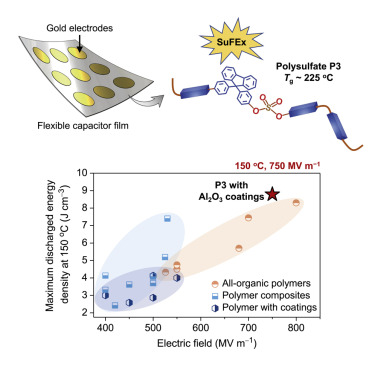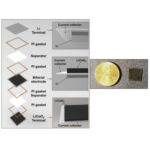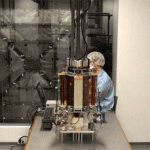2023-01-18 アメリカ合衆国・スクリプス研究所(TSRI)

・ TSRI とローレンスバークレー国立研究所(LBNL)が、薄くフレキシブルなポリスルフェイト(polysulfate)複合物を使用した、ポリマーフィルムキャパシタを開発。
・ 「クリック・ケミストリー」の一手法である硫黄-フッ素交換反応(SuFEx)で合成したポリスルフェイトは、市販のものを超える優れた誘電特性を提示。本研究には、クリック・ケミストリーの開発で 2022 年のノーベル化学賞を受賞した、TSRI 所属のバリー・シャープレス氏が含まれる。
・ 誘電材料は、電場内で正負の電荷を生じる絶縁体。エネルギーを貯蔵できるため、キャパシタやトランジスタをはじめとする電子回路のユビキタスな構成部品に利用されている。誘電材料の多くは、軽量、フレキシブルでプラスチックのようなポリマー。
・ 新ポリスルフェイト複合物は、高密度のエネルギーを貯蔵・放出するポリマーフィルムキャパシタとして、 従来のポリマーフィルムキャパシタを超える性能を提供し、EV のパワーシステムを含む様々なアプリケーションが期待できる。
・ 酸化アルミニウム(Al2O3)の薄膜層と組み合わたポリマーフィルムキャパシタでは、一般的なポリマーフィルムキャパシタを崩壊させる 7 億 V/m を超える電場と 150℃の高温度の耐久と高密度のエネルギー放出を確認した。
・ 一般的なポリマーフィルムキャパシタは熱に弱く、例えばある EV モデル等のシステムでは高額で煩雑な冷却システムが必要となる。新ポリスルフェイト材料は、EV や他のアプリケーションでの安価、シンプルで高耐久性のパワーシステムを可能にする。
・ 性能をほとんど損失せずに 200~250℃を耐久する、より優れた特性のポリスルフェイトの発見を目指し、引き続きその合成と研究を実施する。
・ 本研究には、米国エネルギー省(DOE)、米国立科学財団(NSF)および米国立衛生研究所(NIH)が資金を提供した。
URL: https://www.scripps.edu/news-and-events/press-room/2023/20230118-wu-polysulfates.html
<NEDO海外技術情報より>
関連情報
Joule 掲載論文(アブストラクトのみ:全文は有料)
High-performing polysulfate dielectrics for electrostatic energy storage under harsh conditions
URL: https://www.sciencedirect.com/science/article/pii/S2542435122006092?dgcid=coauthor
関連情報
2023-02-15 アメリカ合衆国・ローレンスバークレー国立研究所(LBNL))
次世代エネルギー貯蔵デバイスを実現する高温度と電界を耐える新複合材(New Compound That Withstands Extreme Heat and Electricity Could Lead to Next-Generation Energy Storage Devices)
URL: https://newscenter.lbl.gov/2023/02/15/new-compound-could-lead-to-next-generation-energy-storage-devices/
Highlights
- •Polysulfates are revealed as excellent dielectric materials for the first time
- •Polysulfate-based film capacitors deliver superior energy density under high heat
- •Coating of ultrathin Al2O3 nanolayers increases energy storage capacity
- •The high fidelity “click” synthesis sets the stage for more robust dielectrics
Context & scale
The growing demand for electrification technologies critically calls for polymer-based film capacitors that can deliver higher energy density under harsh thermal and electrical conditions. It is clearly an unmet materials challenge, as there are very few examples of polymers that remain electrically insulating, thermally stable, and mechanically flexible under desired extreme conditions. Polysulfates, made from a near-perfect click chemistry reaction, have emerged as a promising class of material for flexible, lightweight, heat-resistance dielectric film capacitors with outstanding energy storage capacity. They are strong contenders to the state-of-the-art polymer dielectrics to improve the energy efficiency of integrated power systems in electric vehicles by mass and volume reductions. The materials chemistry accommodates extraordinary structural diversity and scalability, which offers a viable path to polymers with higher energy density, thermal stability, and electrical reliability.
Summary
High-capacity polymer dielectrics that operate with high efficiencies under harsh electrification conditions are essential components for advanced electronics and power systems. It is, however, fundamentally challenging to design polymer dielectrics that can reliably withstand demanding temperatures and electric fields, which necessitate the balance of key electronic, electrical, and thermal parameters. Herein, we demonstrate that polysulfates, synthesized by sulfur(VI) fluoride exchange (SuFEx) catalysis, another near-perfect click chemistry reaction, serve as high-performing dielectric polymers that overcome such bottlenecks. Free-standing polysulfate thin films from convenient solution processes exhibit superior insulating properties and dielectric stability at elevated temperatures, which are further enhanced when ultrathin (∼5 nm) oxide coatings are deposited by atomic layer deposition. The corresponding electrostatic film capacitors display high breakdown strength (>700 MV m−1) and discharged energy density of 8.64 J cm−3 at 150°C, outperforming state-of-the-art free-standing capacitor films based on commercial and synthetic dielectric polymers and nanocomposites.




